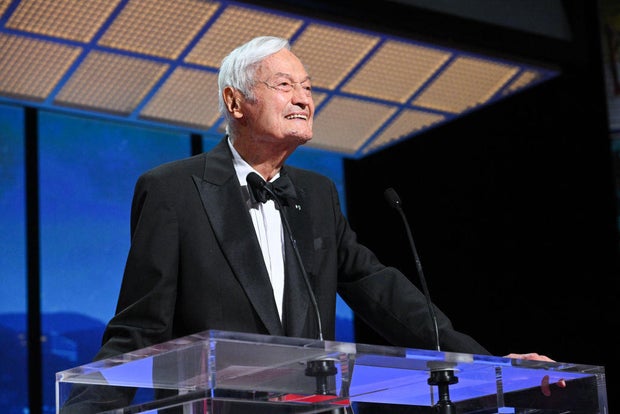Roger Corman, the Oscar-winning “King of Bs” who helped produce low-budget classics like “Little Shop of Horrors” and “Attack of the Crab Monsters” and gave many of Hollywood’s most famous actors and directors initial opportunities, died. He was 98 years old.
Corman died Thursday at his home in Santa Monica, Calif., his daughter Catherine Corman said in a statement Saturday.
“He was generous, open-hearted and kind to all who knew him,” the statement said. “When asked how he would like to be remembered, he said, ‘I was a filmmaker, that’s all.’”
Stéphane Cardinale – Corbis/Corbis via Getty Images
Starting in 1955, Corman helped create hundreds of films as a producer and director, including “Black Scorpion,” “Bucket of Blood” and “Bloody Mama.” A notable judge of talent, he hired aspiring filmmakers such as Francis Ford Coppola, Ron Howard, James Cameron and Martin Scorsese. In 2009, Corman received an honorary Oscar.
“There are a lot of restrictions associated with working on a low budget, but at the same time there are certain opportunities,” Corman said in a 2007 documentary about Val Lewton, director of “Cat People” and other 1940s underground classics.
“You can gamble a little more. You can experiment. You have to find a more creative way to solve a problem or present a concept.”
The roots of Hollywood’s golden age in the 1970s can be found in Corman’s films. Jack Nicholson made his film debut as the title character in a 1958 Corman quickie, “The Cry Baby Killer,” and stayed with the company for biker, horror and action films, writing and producing some of them.
Other actors whose careers began in Corman’s films included Robert De Niro, Bruce Dern and Ellen Burstyn. Peter Fonda’s appearance in “The Wild Angels” was a precursor to his own biker film “Easy Rider,” co-starring Nicholson and fellow Corman alumnus Dennis Hopper. “Boxcar Bertha,” starring Barbara Hershey and David Carradine, was one of Scorsese’s first films.
Corman’s directors were given tiny budgets and were often told to finish their films in just five days. When Howard, who would go on to win a best director Oscar for “A Beautiful Mind,” asked for an extra half day to reshoot a scene from “Grand Theft Auto” in 1977, Corman told him, “Ron, you can come back if you want, but no one else will be there.”
Initially, only drive-ins and specialty theaters booked Corman films, but as teenagers began to show up, national chains relented. Corman’s films were open-ended for the time about sex and drugs, such as his 1967 release “The Trip,” an explicit film. story about LSD written by Nicholson and starring Fonda and Hopper.
Meanwhile, he discovered a profitable alternative by releasing prestige foreign films in the United States, among them Ingmar Bergman’s “Cries and Whispers,” Federico Fellini’s “Amarcord” and Volker Schlondorff’s “The Tin Drum.” The last two won the Oscar for best foreign film.
Corman started out as a messenger for Twentieth Century-Fox, eventually training as a story analyst. After briefly abandoning the business to study English literature for a period at Oxford, he returned to Hollywood and began his career as a film producer and director.
Despite his petty ways, Corman remained on good terms with his directors, boasting that he had never fired one because “I wouldn’t want to inflict that humiliation”.
Some of his former subordinates returned his kindness years later. Coppola cast him in “The Godfather, Part II,” Jonathan Demme cast him in “The Silence of the Lambs” and “Philadelphia,” and Howard gave him a role in “Apollo 13.”
Most of Corman’s films were quickly forgotten by all but die-hard fans. A rare exception was 1960’s “Little Shop of Horrors,” which starred a bloodthirsty, human-eating plant and featured Nicholson in a small but memorable role as a pain-loving dental patient. It inspired a long-running musical and a 1986 musical adaptation starring Steve Martin, Bill Murray and John Candy.
In 1963, Corman began a series of films based on the works of Edgar Allan Poe. The most notable was “The Raven,” which teamed Nicholson with veteran horror stars Boris Karloff, Peter Lorre and Basil Rathbone. Directed by Corman on a rare three-week schedule, the horror parody received good reviews, a rarity for his films. Another Poe adaptation, “House of Usher,” was deemed worthy of preservation by the Library of Congress.
Near the end of his life, Karloff starred in another Corman-backed film, the 1968 thriller “Targets,” which marked Peter Bogdanovich’s directorial debut.
Corman’s success generated offers from major studios, and he directed “The St. Valentine’s Day Massacre” and “Von Richthofen and Brown” on normal budgets. Both were disappointments, however, and he attributed the failure to front-office interference.
Roger William Corman was born in Detroit and raised in Beverly Hills, but “not in the well-to-do area,” he once said. He attended Stanford University, graduating with a degree in engineering, and arrived in Hollywood after three years in the Navy.
After his time at Oxford, he worked as a television stagehand and literary agent before finding his life’s work.
In 1964, he married Julie Halloran, a UCLA graduate who also became a producer. They had three children: Catherine, Roger and Brian.
He is survived by Julie, Catherine and Mary, his daughter said in the statement.
























